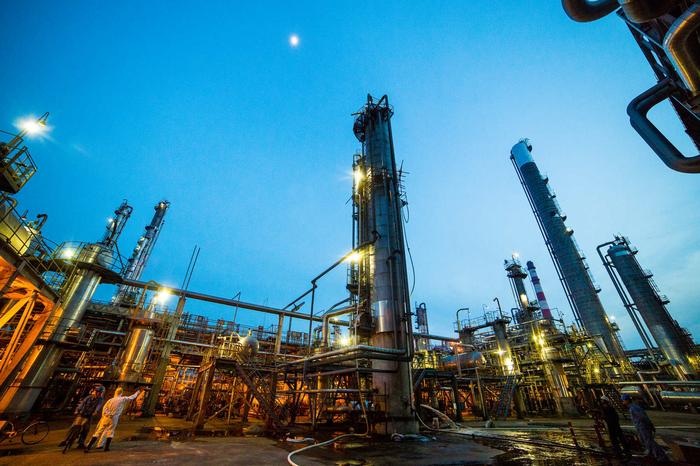


Chinese scientists have made significant progress in the direct conversion of olefins from synthesis gas, which will lower the petrochemical energy consumption required to produce olefins.
The result of the research, led by Shanghai Tech University and the Shanghai Advanced Research Institute under the Chinese Academy of Sciences, was published in the British scientific journal Nature on Oct. 5.
Olefin is a basic carbon-based building block that is widely used in the production of industrial chemicals and plastics. It is an important contributor to synthetic rubber, synthetic plastics, high-grade lubricants, fatty alcohols, high-density jet fuels and more. The chemical compounds are obtained from petroleum and other fossil fuels, or renewable sources such as corn or sugarcane.
To obtain olefin from coal or natural gas requires several steps. First, either substance must be converted into synthesis gas, or syngas, which is then made into methanol, which finally becomes olefin. Scientists all over the world have been working on simplifying the process to increase energy efficiency.
The Shanghai team created a promising new catalyst, cobalt carbide nanoprisms, which catalyzes the conversion of syngas with high selectivity for the production of olefins. The conversion can occur under mild reaction conditions, which means lower temperatures and pressure. The olefin yield nevertheless remains satisfactory.
In the next step of the project, scientists from the Shanghai Advanced Research Institute will join hands with various companies to realize the industrial application of their catalyst. They will work together to design an apparatus for catalytic amplification, further refining the manufacturing procedure.
 Fire brigade in Shanghai holds group wedding
Fire brigade in Shanghai holds group wedding Tourists enjoy ice sculptures in Datan Town, north China
Tourists enjoy ice sculptures in Datan Town, north China Sunset scenery of Dayan Pagoda in Xi'an
Sunset scenery of Dayan Pagoda in Xi'an Tourists have fun at scenic spot in Nanlong Town, NW China
Tourists have fun at scenic spot in Nanlong Town, NW China Harbin attracts tourists by making best use of ice in winter
Harbin attracts tourists by making best use of ice in winter In pics: FIS Alpine Ski Women's World Cup Slalom
In pics: FIS Alpine Ski Women's World Cup Slalom Black-necked cranes rest at reservoir in Lhunzhub County, Lhasa
Black-necked cranes rest at reservoir in Lhunzhub County, Lhasa China's FAST telescope will be available to foreign scientists in April
China's FAST telescope will be available to foreign scientists in April "She power" plays indispensable role in poverty alleviation
"She power" plays indispensable role in poverty alleviation Top 10 world news events of People's Daily in 2020
Top 10 world news events of People's Daily in 2020 Top 10 China news events of People's Daily in 2020
Top 10 China news events of People's Daily in 2020 Top 10 media buzzwords of 2020
Top 10 media buzzwords of 2020 Year-ender:10 major tourism stories of 2020
Year-ender:10 major tourism stories of 2020 No interference in Venezuelan issues
No interference in Venezuelan issues
 Biz prepares for trade spat
Biz prepares for trade spat
 Broadcasting Continent
Broadcasting Continent Australia wins Chinese CEOs as US loses
Australia wins Chinese CEOs as US loses